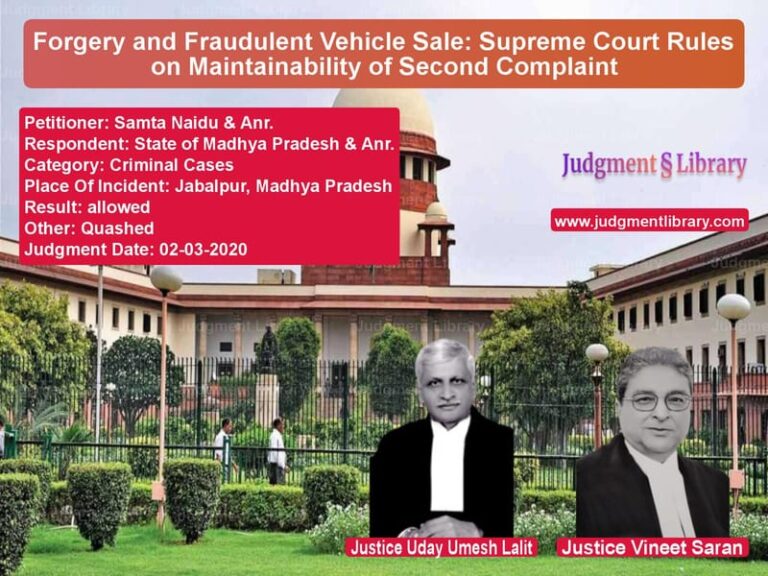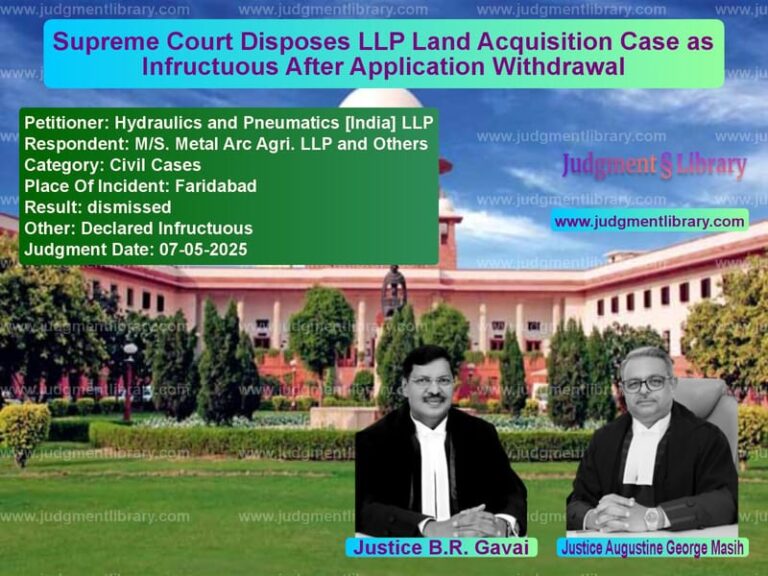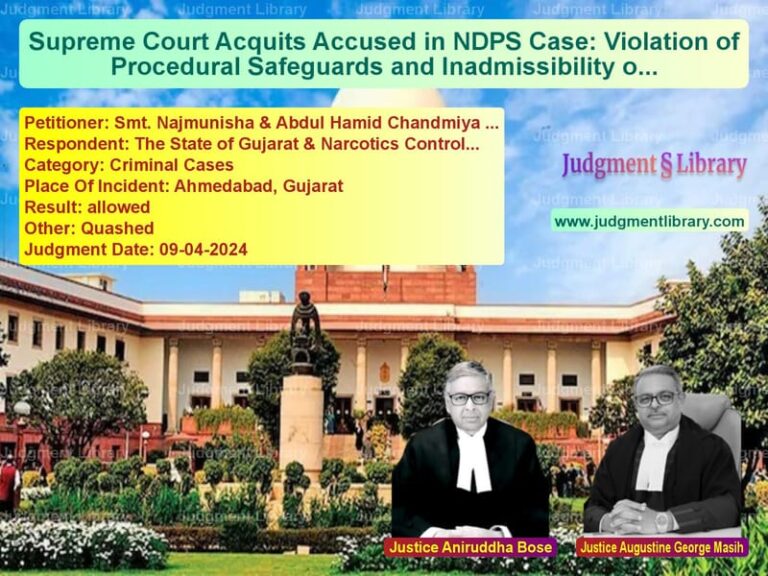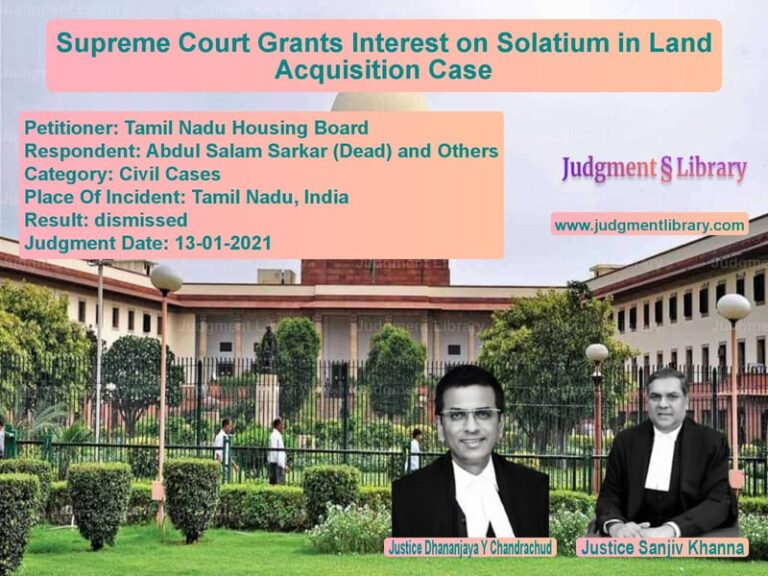Supreme Court Remands Environmental Penalty Case Back to National Green Tribunal
The Supreme Court of India, in its judgment dated January 30, 2024, set aside the orders of the National Green Tribunal (NGT) that had imposed penalties without providing an opportunity for the affected parties to be heard. The case, involving the appellants Veena Gupta and others against the Central Pollution Control Board and other respondents, revolved around ex parte orders issued by the NGT in suo motu proceedings. The Supreme Court ruled that the matter should be reconsidered by the NGT after giving due hearing to all involved parties.
Background of the Case
The NGT had initiated suo motu proceedings and imposed environmental penalties on the appellants without issuing a notice or allowing them an opportunity to present their case. The tribunal’s order stated that the appellants were operating without statutory consent in a non-conforming area, endangering life and health. The penalties imposed were severe, and the order directed coercive measures in case of non-compliance.
Following this, the affected parties, including appellant No. 2, filed a review petition, contending that they had not been heard before the adverse order was passed. However, the NGT dismissed the review petition, maintaining its earlier decision.
Key Legal Issues
- Whether the NGT’s decision to impose penalties without issuing notices to the affected parties violated principles of natural justice.
- Whether ex parte orders in environmental cases should be reconsidered if procedural lapses occur.
- Whether the NGT should adopt a more transparent and procedural approach in similar matters.
Petitioner’s Arguments
The appellants argued that the NGT’s ex parte order was passed without providing them a chance to be heard, which was a fundamental violation of natural justice. They emphasized that the penalties imposed were severe, and without their side of the story being considered, the decision was unfair. They further contended that the review petition dismissal showed a trend of procedural shortcuts being taken by the tribunal.
Respondent’s Arguments
The Central Pollution Control Board and other respondents defended the tribunal’s order, arguing that the findings were based on a joint committee inspection that had confirmed statutory violations. They contended that environmental protection required urgent action and that ex parte decisions were necessary in cases where violations were well-documented.
Supreme Court’s Observations
The Supreme Court criticized the NGT’s approach, noting:
“The National Green Tribunal’s recurrent engagement in unilateral decision making, provisioning ex post facto review hearing and routinely dismissing it has regrettably become a prevailing norm. In its zealous quest for justice, the Tribunal must tread carefully to avoid the oversight of propriety.”
The Court further stated that while environmental protection is paramount, due process and fair hearing cannot be sacrificed:
“The practice of ex parte orders and the imposition of damages amounting to crores of rupees, have proven to be a counterproductive force in the broader mission of environmental safeguarding.”
Referring to prior judgments, the Court emphasized that NGT orders issued without hearing affected parties have often been stayed, which undermines the tribunal’s credibility.
Final Judgment
The Supreme Court set aside the NGT’s orders and remanded the matter back to the tribunal. The NGT was directed to issue notices to all affected parties, allow them a fair hearing, and then pass appropriate orders based on proper judicial considerations.
The Court clarified that its order did not comment on the merits of the case, and that any violations of statutory and environmental laws would still be subject to strict scrutiny.
Key Takeaways from the Judgment
- Ex parte orders in environmental cases must be issued cautiously, ensuring affected parties have a chance to present their case.
- NGT should avoid procedural shortcuts that compromise fairness and due process.
- While environmental violations need strong action, legal penalties must be imposed after following proper judicial procedures.
The judgment serves as a reminder that environmental governance must balance urgency with fairness, reinforcing the role of due process in India’s environmental jurisprudence.
Petitioner Name: Veena Gupta & Anr..Respondent Name: Central Pollution Control Board & Ors..Judgment By: Justice Pamidighantam Sri Narasimha, Justice Aravind Kumar.Place Of Incident: Delhi.Judgment Date: 30-01-2024.
Don’t miss out on the full details! Download the complete judgment in PDF format below and gain valuable insights instantly!
Download Judgment: veena-gupta-&-anr.-vs-central-pollution-co-supreme-court-of-india-judgment-dated-30-01-2024.pdf
Directly Download Judgment: Directly download this Judgment
See all petitions in Environmental Cases
See all petitions in Judgment by P.S. Narasimha
See all petitions in Judgment by Aravind Kumar
See all petitions in Remanded
See all petitions in supreme court of India judgments January 2024
See all petitions in 2024 judgments
See all posts in Environmental Cases Category
See all allowed petitions in Environmental Cases Category
See all Dismissed petitions in Environmental Cases Category
See all partially allowed petitions in Environmental Cases Category







